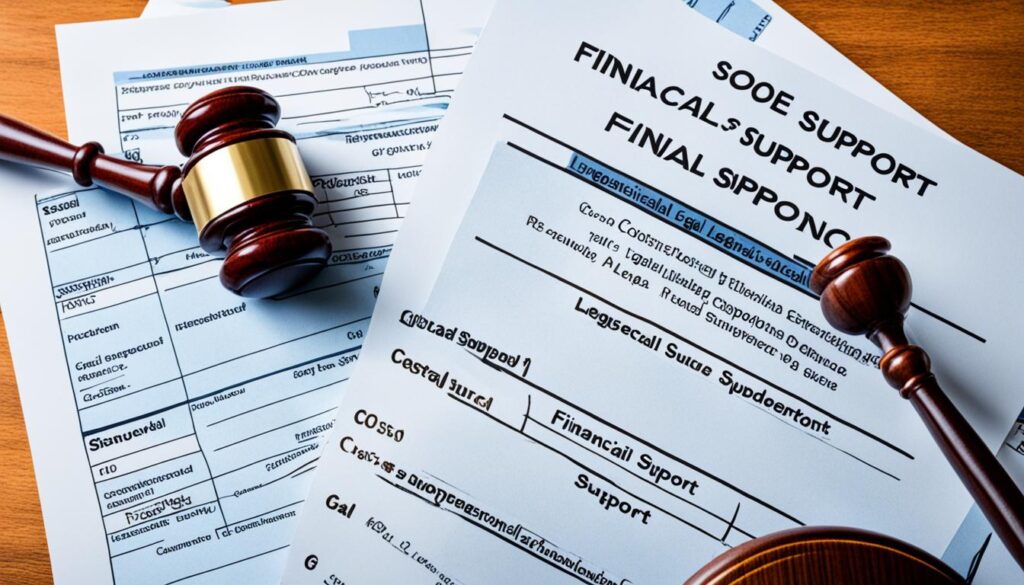If you are an expatriate residing in Costa Rica and thinking about getting a divorce, it is crucial to familiarize yourself with the divorce proceedings in the country. Costa Rica has clear-cut protocols in place, which enable a fairly swift and uncomplicated divorce, regardless of one partner’s citizenship status. The judicial system in Costa Rica generally leans towards supporting women in instances of domestic abuse, guaranteeing a just outcome.
Key Takeaways:
- The divorce process in Costa Rica is accessible and accepted for both citizens and expats.
- Costa Rican courts tend to favor women in cases of domestic violence during divorce proceedings.
- Expert legal assistance can help navigate the complexities of Costa Rican divorce law.
- Understanding the process of property division, alimony, and child custody is crucial.
- Consulting with a specialized law firm can ensure a fair resolution for all parties involved.
Benefits of Hiring a Divorce Lawyer in Costa Rica
When going through a divorce in Costa Rica, it is highly recommended to hire a divorce lawyer for the best outcome. A skilled attorney can provide expert legal representation, ensuring that your rights and interests are protected throughout the divorce proceedings.
One reputable law firm that specializes in divorce law in Costa Rica is Meléndez & Bonilla. Their team of experienced lawyers understands the complexities of Costa Rican divorce law and can navigate the process effectively on your behalf.
Here are some key benefits of hiring a divorce lawyer:
- Expert Legal Guidance: A divorce lawyer is well-versed in Costa Rican divorce law and can provide you with the necessary guidance and advice. They can explain the legal processes, rights, and obligations, helping you make informed decisions.
- Objective Perspective: Going through a divorce can be emotionally challenging, making it difficult to make rational decisions. A divorce lawyer can provide an objective perspective and help you focus on the legal aspects of the proceedings.
- Effective Negotiation: Divorce often involves negotiating various aspects, such as division of assets, child custody, and support. A skilled lawyer can negotiate on your behalf, striving for a fair settlement that meets your needs.
- Protection of Rights: Your divorce lawyer will ensure that your rights are protected throughout the process. They will advocate for your interests, ensuring that you are treated fairly in property division, spousal support, and child-related matters.
- Reduced Stress: Dealing with legal matters on your own can be overwhelming. By hiring a divorce lawyer, you can alleviate some of the stress and burden associated with the divorce proceedings. They will handle legal documentation, court appearances, and communication with the other party’s attorney, allowing you to focus on rebuilding your life.
By enlisting the services of a qualified divorce lawyer in Costa Rica, such as those at Meléndez & Bonilla, you can have peace of mind knowing that your case is being handled by professionals who have your best interests at heart.
Finding the Right Divorce Lawyer
When searching for a divorce lawyer in Costa Rica, it is important to consider their experience, expertise, and track record in handling divorce cases. Look for a law firm that specializes in family law and has a successful history of representing clients in divorce proceedings. Additionally, consider scheduling a consultation to discuss your case and get a sense of how the lawyer communicates and relates to you.
“Hiring a divorce lawyer can greatly benefit your case. Their knowledge of the law, negotiation skills, and dedication to protecting your rights can make all the difference.”
Process of Divorce in Costa Rica
Most divorces in Costa Rica are based on a mutually agreed settlement between the husband and wife. The process involves reaching an agreement on property division, alimony, child support, visitation rights, and custody. Through negotiation and mediation, Meléndez & Bonilla can assist in ensuring a fair resolution for both parties.
1. Mutual Agreement Divorce
In a mutual agreement divorce, both spouses agree to end their marriage and cooperate in resolving important issues such as property division, financial support, and child custody. This type of divorce is typically less contentious and more amicable, allowing for a smoother process.
2. Property Division
During the divorce process, the division of property acquired during the marriage is a crucial aspect to consider. Costa Rican law follows the community property system, which means that assets and debts acquired during the marriage are considered jointly owned and should be divided equitably.
3. Alimony
When it comes to alimony or spousal support, Costa Rican divorce law considers factors such as the length of the marriage, the income and assets of each spouse, and the standard of living during the marriage. The court may award alimony payments to ensure the financial well-being of the dependent spouse.
4. Child Support and Visitation Rights
The well-being and best interests of the child are of utmost importance in Costa Rican divorce cases. Child support is awarded independently of any agreements made between the parents and is determined based on the child’s needs and the parents’ financial capabilities. Additionally, visitation rights and custody arrangements are established to provide a stable and nurturing environment for the child.
Working with experienced divorce lawyers, such as those at Meléndez & Bonilla, can help ensure that your rights and the best interests of your children are protected throughout the divorce process in Costa Rica.

“In a mutual agreement divorce, both spouses agree to end their marriage and cooperate in resolving important issues such as property division, financial support, and child custody.”
By following the legal procedures for divorce in Costa Rica and seeking professional guidance, couples can navigate the process smoothly and reach a fair settlement. Whether it’s negotiating property division, determining alimony, or establishing child support and custody arrangements, the expertise of Meléndez & Bonilla can provide invaluable support.
Spousal Support Laws in Costa Rica
Costa Rica has comprehensive spousal support laws in place that govern the provision of financial support to a spouse after a divorce. These laws, which fall under the purview of family law, include alimony and divorce laws. When determining spousal support amounts, various factors are taken into consideration, including:
- The length of the marriage
- The income and assets of each spouse
- The standard of living maintained during the marriage
These factors play a crucial role in establishing a fair and equitable spousal support arrangement that ensures financial stability for both parties post-divorce.
To better understand the implications of spousal support laws in Costa Rica, it is advisable to seek guidance from a knowledgeable divorce lawyer specializing in family law. They can provide expert legal advice tailored to your unique circumstances and help navigate the complexities of the divorce process.
“Spousal support laws in Costa Rica prioritize the financial well-being and stability of individuals following divorce, taking into account the duration of the marriage, income disparities, and the lifestyle maintained during the union.”
By consulting with a reputable law firm like Meléndez & Bonilla, you can gain insights into your rights and obligations under spousal support laws. Their experienced attorneys have a deep understanding of the intricacies of Costa Rican divorce law and can guide you towards a favorable resolution.
Spousal Support Laws in Costa Rica – Key Considerations
| Factors Considered in Spousal Support Determination | Explanation |
|---|---|
| Duration of the Marriage | The length of the marriage plays a significant role in assessing the financial obligations towards the spouse. |
| Income and Assets | The income and assets of each spouse are evaluated to determine their respective financial capacity to provide support. |
| Standard of Living | The standard of living maintained during the marriage is considered to ensure an appropriate level of financial support post-divorce. |
Understanding the intricacies of spousal support laws can significantly impact the outcome of a divorce settlement. Therefore, it is essential to work with a trusted legal partner who specializes in family law and ensures your interests are protected.

Division of Assets in Costa Rican Divorce
In a Costa Rican divorce, the division of assets is an important consideration. Costa Rica operates under a system of community property, which means that assets and debts acquired during the marriage are generally considered jointly owned by both spouses. As a result, these assets and debts are subject to division during the divorce proceedings.
Under Costa Rican marriage laws, the default principle is that assets should be divided equally between the spouses, unless there are specific agreements stating otherwise. This means that both parties are entitled to an equal share of the marital assets, regardless of which spouse acquired them.
This division of assets can include a wide range of property, including real estate, vehicles, bank accounts, investments, businesses, and personal belongings. It is essential to take all these assets into account and ensure a fair distribution.
However, it is important to note that there may be exceptions to the equal division of assets. For example, if there are prenuptial or postnuptial agreements in place, they can dictate the distribution of assets. Additionally, in cases where one spouse can demonstrate that they contributed significantly more to the acquisition of certain assets, the court may adjust the division accordingly.
For a better understanding of how assets are divided in a Costa Rican divorce, the following table provides an overview of the typical categorization and distribution:
| Category of Assets | Division |
|---|---|
| Real Estate | Usually divided equally between spouses |
| Investments and Business | Typically divided equally, but may require professional valuation and assessment |
| Bank Accounts | Equally divided between spouses |
| Vehicles | Distribution dependent on various factors such as ownership and use |
| Personal Belongings | Typically retained by each individual spouse |
This is just a general overview, and the specific division of assets in a Costa Rican divorce can vary depending on the unique circumstances of each case. It is crucial to consult with an experienced divorce lawyer, such as Meléndez & Bonilla, to ensure a fair and equitable distribution of assets.
By understanding the division of assets in a Costa Rican divorce, individuals can navigate the process more confidently and protect their rights and interests.

Child Custody and Support in Costa Rican Divorce
When it comes to divorce in Costa Rica, the well-being of the children involved takes precedence. The court’s primary concern is to determine child custody and visitation rights based on the best interests of the child. Additionally, the issue of child support is addressed independently of any agreements made between the parents. Costa Rican child protection law ensures that the needs of the child are met, both emotionally and financially.
The Law Firm of Melendez & Bonilla specializes in handling child custody and support cases, providing expert legal guidance and representation. Their experienced attorneys understand the complexities of Costa Rican divorce law and are committed to helping parents navigate the process and reach a fair resolution that prioritizes the best interests of the child.

| Aspect | Explanation |
|---|---|
| Child Custody | The court determines which parent will have legal and physical custody of the child based on the child’s best interests. |
| Visitation Rights | The noncustodial parent is awarded visitation rights to maintain a meaningful relationship with the child. |
| Child Support | The court calculates and awards child support independently of any agreements made between the parents, ensuring the child’s financial well-being. |
| Costa Rican Child Protection Law | The laws in place prioritize the protection and well-being of children throughout the divorce process. |
With the support of Melendez & Bonilla, parents can rely on their expertise in child custody and support matters during a Costa Rican divorce. Rest assured that your child’s best interests will be advocated for and protected throughout the legal proceedings.
Legal Assistance for Expats in Costa Rican Divorce
Expatriates going through a divorce in Costa Rica may face unique challenges. The unfamiliarity with the local legal system and language barriers can make the divorce process complex and overwhelming. The assistance of legal experts who are well-versed in the intricacies of Costa Rican divorce law is crucial for ensuring a smooth and fair resolution.
One such expert is Costa Rica Immigration Experts (CRIE), a trusted firm that specializes in providing legal assistance for expats in various areas, including divorce. CRIE offers valuable guidance on immigration, residency, and citizenship matters, making them well-equipped to handle the specific needs of expatriates going through a divorce in Costa Rica.
By seeking the expertise of Costa Rica Immigration Experts, expats can benefit from:
- Navigating the complex legal process: CRIE understands the ins and outs of the Costa Rican legal system, including the divorce process. Their experienced team can guide expats through every step of the process, ensuring they meet all the necessary requirements and deadlines.
- Expert advice on divorce-related issues: Whether it’s child custody, property division, or spousal support, CRIE can provide valuable advice and assistance in resolving these matters. They have in-depth knowledge of Costa Rican divorce laws and can help expats make informed decisions that protect their interests and rights.
- Fair resolution and negotiation: CRIE’s expertise extends to negotiation and mediation, allowing them to help expats reach fair agreements with their spouses. Their goal is to ensure that the divorce process is as smooth as possible while prioritizing the best interests of their clients.
Why Choose Costa Rica Immigration Experts?
“We understand the unique challenges expats face when going through a divorce in Costa Rica. Our team of legal experts is dedicated to providing comprehensive legal assistance to expats, ensuring their rights are protected and their interests are represented. With our guidance, expats can navigate the divorce process with confidence and achieve a fair resolution.”
With the help of Costa Rica Immigration Experts, expats can focus their energy on moving forward and rebuilding their lives, knowing that their legal matters are in capable hands. By availing the services of CRIE, expatriates can benefit from a personalized approach and expert guidance throughout the divorce process.
For legal assistance tailored to the unique needs of expats in Costa Rican divorce cases, contact Costa Rica Immigration Experts today.

Recognition of U.S. and Foreign Divorces in Costa Rica
A judgment of divorce from a state court in the U.S. may be recognized in Costa Rica. However, it is advisable to consult an attorney in Costa Rica to determine if a U.S. divorce will be recognized. Similarly, foreign divorces may be recognized in the United States, but each state has its own laws regarding the recognition of foreign divorces.
When seeking recognition of a U.S. divorce in Costa Rica, it is crucial to understand the recognition process and the specific requirements set forth by Costa Rican divorce recognition laws. Consulting with a knowledgeable attorney, such as the team at Meléndez & Bonilla, can help navigate the complexities and increase the likelihood of a successful recognition.
Conversely, if you have obtained a divorce in a foreign country and wish to have it recognized in the United States, it is essential to understand the recognition laws of the particular state where you seek recognition. Each state has its own criteria for recognizing foreign divorces, which may include factors such as residency requirements or specific legal procedures.
Recognition of U.S. Divorce in Costa Rica
Recognition of a U.S. divorce in Costa Rica is possible, but the process can vary depending on the circumstances. The Costa Rican courts generally recognize foreign divorce judgments if they meet certain criteria:
- The divorce must be granted by a competent court in the U.S.
- The U.S. court must have had jurisdiction over the divorce case.
- The U.S. divorce decree must be final and conclusive.
- The U.S. divorce judgment must comply with Costa Rican public policy and legal principles.
Consulting with a Costa Rican attorney who specializes in divorce recognition laws can provide valuable guidance and ensure that all necessary documentation and procedures are followed for the recognition of a U.S. divorce in Costa Rica.
Recognition of Foreign Divorce in the United States
Recognition of a foreign divorce in the United States is determined by the individual states, as they have the authority to establish their own recognition laws. While the Full Faith and Credit Clause of the U.S. Constitution generally requires states to recognize valid foreign divorces, the specific requirements for recognition may vary.
To determine the recognition of a foreign divorce in a particular state, it is crucial to consult the laws of that state or seek legal advice from an attorney experienced in family law in the respective jurisdiction. They can provide insights into the specific criteria and procedures necessary to obtain recognition of a foreign divorce.
| State | Recognition Requirements |
|---|---|
| Texas | Recognition of a foreign divorce in Texas requires that the foreign divorce be valid under the laws of the country where it was granted, and at least one of the parties must have been a resident of Texas for at least six months prior to filing for divorce. Additional documentation and procedures may also apply. |
| California | California recognizes foreign divorces if they were properly obtained in accordance with the laws of the foreign country and if one or both parties meet residency requirements. The party seeking recognition must file a petition with the California court, providing evidence of the foreign divorce and other supporting documentation. |
| New York | New York recognizes foreign divorces if the foreign court had proper jurisdiction and both parties were given a fair opportunity to be heard in the foreign divorce proceeding. The party seeking recognition must file an action in the New York Supreme Court, providing evidence of the foreign divorce decree and other supporting documents. |
It is essential to remember that the information provided in the table is not exhaustive, and the recognition requirements may differ from state to state. Seeking legal advice from an attorney well-versed in family law in the relevant state can ensure compliance with specific recognition laws.
Modification and Enforcement of Spousal Support
Modifying spousal support is possible when there are significant changes in circumstances that warrant a review of the existing arrangement. This can include situations such as remarriage or a substantial increase in income. By seeking a modification of spousal support, individuals can ensure that the amount reflects the current needs and financial capabilities of both parties.
However, when a spouse fails to comply with court-ordered support payments, enforcement measures may need to be taken. These measures aim to ensure that the support obligation is fulfilled and that the receiving spouse does not face financial hardships as a result of non-payment. Some enforcement options include wage garnishment, property liens, and even contempt of court charges for non-compliance.
Key Points:
- Spousal support can be modified if there are significant changes in circumstances.
- Enforcement measures can be pursued if a spouse fails to pay court-ordered support.
- Enforcement options include wage garnishment, property liens, and contempt of court charges.
It is important to consult with a qualified family lawyer to navigate the complex processes of modification and enforcement of spousal support. They can provide invaluable guidance and represent your interests to ensure a fair and just outcome.
Conclusion
Concluding the divorce process in Costa Rica can be a daunting task, especially for expats. However, with the guidance of a skilled divorce lawyer and a thorough understanding of the legal framework, a fair resolution can be achieved. It is crucial to be well-informed about the spousal support laws, division of assets, child custody and support provisions, as well as the recognition of foreign divorces in both Costa Rica and the United States.
By seeking expert legal advice, individuals can navigate the complexities of the process and ensure the best possible outcome in their divorce cases. Meléndez & Bonilla, a reputable law firm specializing in divorce law in Costa Rica, offers experienced legal services for both residents and international clients. Their proficiency in handling divorce cases and familiarity with Costa Rican divorce law can provide the necessary guidance and support throughout the divorce process.
In summary, to successfully navigate a divorce in Costa Rica, expats should consult with a reputable divorce lawyer, stay informed about the relevant legal aspects, and rely on expert legal guidance. By doing so, they can achieve a fair resolution and move forward with their lives.
FAQ
Is filing for divorce in Costa Rica a quick and easy process?
Yes, filing for divorce in Costa Rica is a fairly quick and easy process.
Can I file for divorce in Costa Rica even if I am not a citizen?
Yes, filing for divorce in Costa Rica is accepted even if one of the partners is not a citizen.
Does the court favor women in cases of domestic violence?
Yes, the court usually favors women in cases of domestic violence.
Why should I hire a divorce lawyer in Costa Rica?
It is highly recommended to hire a divorce lawyer in Costa Rica for the best outcome in your divorce proceedings.
What can a divorce lawyer in Costa Rica help with?
A divorce lawyer in Costa Rica can provide expert legal guidance and support and have extensive experience in handling divorce cases.
What is involved in the divorce process in Costa Rica?
The divorce process in Costa Rica involves reaching an agreement on property division, alimony, child support, visitation rights, and custody.
What are the spousal support laws in Costa Rica?
Costa Rica has spousal support laws in place, which include alimony and divorce laws.
How are assets divided in a Costa Rican divorce?
In a Costa Rican divorce, assets acquired during the marriage are typically divided equally unless there are agreements stating otherwise.
How is child custody and support determined in Costa Rican divorce cases?
Child custody and support are determined based on the best interests of the child in Costa Rican divorce cases.
Where can expats get legal assistance for their Costa Rican divorce?
Expats can get legal assistance for their Costa Rican divorce from Costa Rica Immigration Experts (CRIE).
Will a judgment of divorce from a state court in the U.S. be recognized in Costa Rica?
A judgment of divorce from a state court in the U.S. may be recognized in Costa Rica, but it is advisable to consult an attorney in Costa Rica to determine if it will be recognized.
Can spousal support be modified?
Yes, spousal support can be modified if there are significant changes in circumstances.
What can be done if a spouse fails to pay court-ordered spousal support?
Legal action can be taken to enforce the support obligation, including wage garnishment or other enforcement measures.
What should expats know about navigating the divorce process in Costa Rica?
Expats should be aware of the spousal support laws, division of assets, child custody and support provisions, and the recognition of foreign divorces in Costa Rica and the United States.
Is the Divorce Process in Costa Rica Similar to the Dominican Republic?
The easiest divorce process Dominican Republic is not similar to Costa Rica. In the Dominican Republic, you can obtain a quick divorce without residency requirements, while in Costa Rica, divorce can be more complicated and time-consuming. It’s important to research the specific laws and regulations of each country before proceeding with a divorce.











